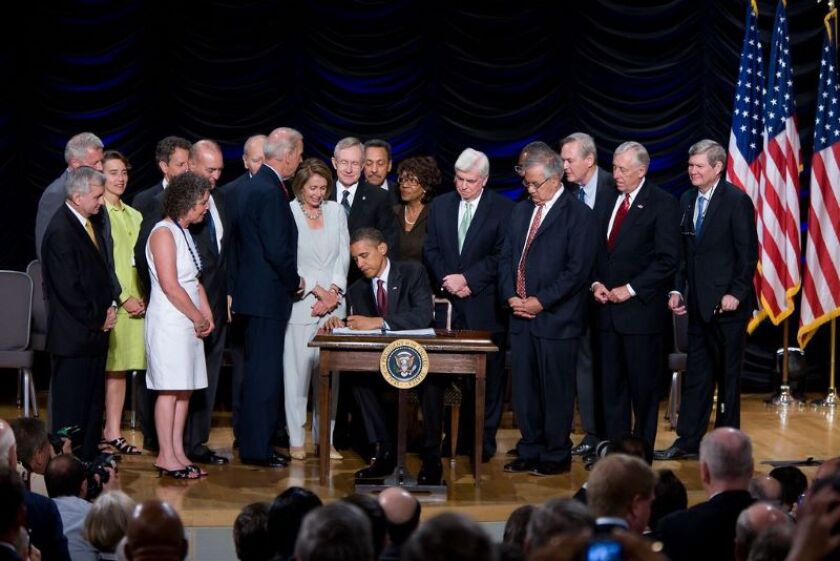For more on the rules and regulations introduced under Dodd-Frank, check out our collection of primers.
This Tuesday marked the 10-year anniversary of the signing ceremony of the Dodd-Frank Wall Street Reform and Consumer Protection Act. From the moment of inception, and through the years that followed, the Act has been a permanent fixture here at IFLR and has provided us with some of the most widely lauded – and debated – pieces of financial regulation to cover, both at the local US level and cross-border.
Dodd-Frank's defining image is arguably that of then-President Obama sat at a large table in the Ronald Reagan Building in Washington DC, surrounded by a veritable who's who of lawmakers, signing the Act into existence. Attendees included the Act's eponymous authors, Senator Chris Dodd and Congressman Barney Frank, Vice-President Joe Biden, Senator Elizabeth Warren and Representative Maxine Waters of the House Financial Services Committee, to name but a few.
The Act was introduced as a direct result of the financial crisis that rocked the world in 2008, and introduced legislation like the Volcker Rule, the Fundamental Review of the Trading Book (FRTB), the Central Securities Depositories Regulation (CSDR), the Consolidated Audit Trail (CAT), and of course Warren's brainchild, the Consumer Financial Protection Bureau (CFPB).
See also: Covid-19 shows Dodd-Frank is working
A decade on and these regulations are still as relevant as ever and, despite attempts by the anti-regulatory Trump administration, remain very much intact.
Speaking at a Better Markets conference held this Tuesday to discuss the merits of the Act 10 years on, Obama discussed the impact and significant role that Dodd-Frank played in the economic recovery his administration oversaw.
"When Joe Biden and I came into office in 2009 we were teetering on the brink of a second Great Depression. Banks were collapsing, credit was freezing up, companies were shedding jobs and closing, and millions of Americans were losing their homes, incomes and retirement savings," he said.
"A lifetime of hard work was evaporated almost in an instance. So as our administration worked quickly to stop the bleeding and recover from the crisis, we also worked to prevent recklessness on Wall Street from devastating folks on Main Street ever again."
The intent of the reforms was to crack down on irresponsible behaviour and, with the creation of the CFPB, to protect ordinary Americans from corrupt, predatory practices, he added. "As you all know, passing and implementing the Act was not easy, We were met every step of the way by an entrenched and well-funded opposition, which tried to block any reform at all."
He continued: "But we kept at it because taxpayers and investors deserved better. We believe our financial system only works, and our market is only free, when there is a basic safeguard in place to prevent abuse, check access and ensure that it is more profitable to play by the rules than to game the system."
See also: Trump's regulatory relaxation boosts bank consolidation
In the years since Obama left office, many of the same players that opposed the Act initially have been doing their best to unravel it again. There have been some limited successes, but the core of Wall Street reform remains intact, he said.
"Our reforms are still promoting financial stability. They are still blocking taxpayer bailouts, still protecting consumers and investors. Even when a pandemic added a historic level of joblessness and contraction, so far these reforms have helped prevent the crisis from spiralling into a financial crisis too," added Obama.
"We can't afford to go back to the days of unchecked recklessness and irresponsibility on Wall Street. We have seen how that plays out. We know we can do better, and we have proven it."
Speaking Frankly
To mark the anniversary, IFLR spoke to Congressman Barney Frank about what the next 10 years will bring, and what the regulation's likely legacy will be. Frank, who expects a Biden victory in November's presidential election, believes that the basic framework of the Act will remain in place for the foreseeable future.
A Biden administration would administer the Act as intended, including the preserving the authority of the CFPB, which he believes will return to its originally intended guise. "I don't see much statutory change. Some innovation may arise that nobody is thinking about now – or is not operational yet – that may have to lead to an extension of authority."
See also: Trump's proposed Dodd-Frank rollback unpicked
"Something like bitcoin would require Dodd-Frank's authority to be more explicit without changing the nature of it," he said. "The US regulatory architecture that emerged from the 30s and the New Deal stayed pretty much the same until we got into it, and the rules we set up will essentially stay the same until there is unanticipated innovation we did not cover."
Despite the aforementioned attempts to roll back elements of the Act, little in the way of real change has been made. The Volcker Rule has been amended to an extent, but still remains functional: liquidity and capital rules were eased slightly, and the threshold for those subject to enhanced prudential standards and stress tests was raised from $50 billion to $250 billion – greatly assisting smaller and regional banks. Frank believes that many of these changes will be revoked under a Biden administration, due to the statutory nature of the Act.
"There are no legislative changes that have to be rolled back. In terms of the fundamental regulatory structure, there have been no big changes," he said.
See also: Primer on Dodd-Frank and stress testing
Frank did concede one regret: not including provisions for risk retention, which he feels would have improved the Act. "We had three categories of home mortgage loans, some that were so big you couldn't make them. Now, small banks can make them if they are ready to hold them in portfolios," he said. "For the bulk of loans, there had to be risk retention if they were securitised."
"There was supposed to be a super safe category, but that was not written well so the super safe category ate up the normal category," he added. "I would like to go back and restrict the number of loans that are going to be totally exempt from risk retention. This could be done without legislation. The regulators made a mistake."
Having retired from office, Congressman Frank now sits on the board of directors at full-service New York-based commercial outfit Signature Bank, which falls into the $50 billion category of banks that became exempt from enhanced prudential standards in 2018. Frank added that he regretted setting such a low threshold for the category in the first place – before he even knew of Signature Bank's existence or joined the board.
"I agreed with [former member of the Board of Governors of the United States Federal Reserve Board] Dan Tarullo that $50 billion was too low, years before I had heard of Signature Bank. What I have learned from being on the bank board is that the complaints of regulatory burden that people are focused on have nothing to do with Dodd-Frank. They have to do with the Patriot Act, anti-money laundering rules, and the Bank Secrecy Act."
Consumer protection
As attested by both President Obama and Barney Frank, one of the most important conceptions of Dodd-Frank was the CFPB. The CFPB, proposed in 2007 by Senator Warren, then a professor at Harvard Law, was installed to protect Americans from rogue debt collectors, payday lenders, and any securities firms that were not acting in their interest.
The CFPB has become almost unrecognisable since Trump's inauguration, with director Richard Cordray resigning from his post and his successors openly stating intentions to undermine the Bureau's authority.
However, a few weeks ago, the US Supreme Court ruled the CFPB's single-director, for-cause removal structure to be unconstitutional because it violates the separation of powers – but also found that the structure can be saved by removing its for-cause termination provision.
See also: Dodd and Frank join CFPB debate
A Biden presidency would almost certainly see the CFPB return to its legislated form. "The biggest change would be to make the CFPB work the way it was supposed to, and the way it used to," said Frank, adding that a previous report from CNN that attempted to emphasise a rift between himself and Senator Warren was, in fact, unsubstantiated.
Rubbishing claims that he considered her to be unfit to fill the position of Treasury Secretary, Frank explained that he simply suggested that the position would put her in the face of unnecessary opposition.
"I would love to see her as vice-president. I would like her to stay in the Senate. Frankly, at this point, there are many more important issues facing the country than financial regulation," he said. "Issues surrounding inequality and housing: I would like to see Elizabeth Warren focus on that. You can't do that from the Treasury, but you can do it as vice-president or from the Senate."
See also: Fin-reg influencers, US Senator Elizabeth Warren
Ten years ago, Warren was instrumental in the creation of the CFPB, and to this day she continues to advocate for it. Delivering the closing keynote at Better Market's conference on Tuesday, Warren warned the audience not to forget about what started the fight for consumer protection in the US.
"Like so many of our nation's problems, the financial crisis was a toxic mix of racism, corruption, and shameless greed. Predatory mortgage lenders started by targeting black and brown communities, where they began clawing away at the hard-earned wealth of black and brown families, and too few people in power could be relied on to care," she said.
"Not the ancestors who were making money hand-over-fist, not the regulators who were cosy with the banks, not the pundits who blamed the borrowers, and not the lenders who were boosting their profits," she continued. "Imagine living in a community that had to overcome decades of housing, discrimination and legalised racism. Imagine a community where homeownership opportunities were finally increasing, and more people were starting to get their piece of the American dream."
See also: Fin-reg influencers, Donald Trump's administration
According to Warren, republicans and bank lobbyists continued to wage war against the CFPB and the American consumer long after Obama's administration, suggesting that legislation to eliminate the CFPB has been introduced in the House and the Senate in every single Congress since the agency was created in 2011.
And despite its track record of nonpartisan protection of consumers, Warren argued that Republicans have directly targeted the CFPB budget and repeatedly sought to chop back its enforcement authority.
"Donald Trump and Republicans are scared of the CFPB because they're buddies with the Wall Street banksters that the CFPB stands up to. Back in 2016, then-candidate Trump made big promises to drain the swamp, ignore the lobbyists and stand up to Wall Street. He lied. In fact, even before he stepped foot in the Oval Office, he filled his transition team and the incoming administration with lobbyists," she added.
"President Trump has had so many bankers in his administration that Goldman Sachs could open up a new branch at 1600 Pennsylvania Ave. Donald Trump isn't going to drain the swamp. Donald Trump lives in the swamp."

